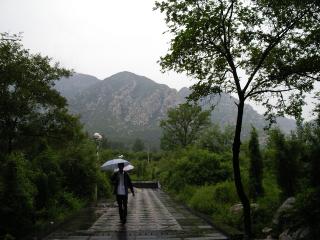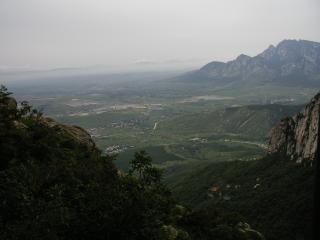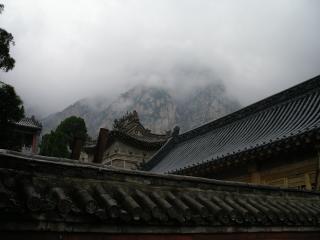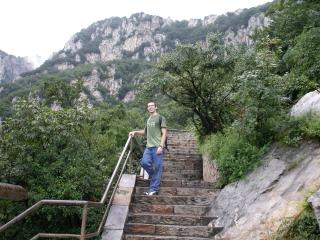It was inevitable. What with being in China and being a somewhat overly grandiose thinker, I was going to produce one of these lists eventually. These have largely come out of discussions with friends on both sides of the Pacific but their statement here in full is new.
1. It will be a Chinese Century
I usually like to qualify this by saying "baring a major disaster or change of fortune," but I feel like being sweeping with this prediction. I am certainly not the first pundit to have done so:
In the past several centuries, international trade has increasingly become the most significant factor in determining global dominance. At least since Rome, and probably before that, the most dominant powers in the Western world have been those buying into the paradigm of trade. Rome understood the primary importance of trade at its peak. In turn, so did the Arab empire, the free states in Northern Italy, Spain and Portugal, Holland, England and finally the US. I would hesitate to make such statements about the non-Western world until more recently, but it is clear that the acceptance of European-style economies boosted pre-war Japan over a stubborn China, and then a post-war Japan, as well as the Four Tigers (South Korea, Taiwan, Hong Kong and Singapore) over a differently-stubborn China. However, if you look at the current state of international economics, it is clear who is becoming dominant. In less than thirty years, China has gone from essentially no foreign trade to one of the biggest-trading countries in the world. It will not need another thirty to surpass the United States as the most important market.
You don't need to look at statistics to see why China is becoming such an economic giant. Certainly, China has the biggest population of any country, a fact which has already made it perhaps the most important producer, but it is increasingly also a country of consumers, which arguably means more in terms of economic power (an argument for another time, but nevertheless a worthwhile one). But beyond these figures, you can look at farmers selling whatever they can find at weekend markets, you can look at museums where everything is for sale, you can look at downtown Shanghai or the smallest villiage and find a culture whose entreprenurial spirit could not be squashed by so small a thing as twenty or thirty years of Mao.
Economics aside, although I would argue (Marxist that I am) that economics is by far the most powerful force in history, China looks poised for leadership. The powers of the last century are on the decline: Russia imploded and shows no signs of resurfacing any time soon; the EU weilds some power, but doesn't have the unity of purpose for real global leadership; the US shows serious signs of decline. We haven't had a real builder as a leader since Jackson, we haven't had a real reformer since the sixties. All we have left are misguided crusaders (like Reagan and Bush the younger) and corrupt bureaucrats (like the rest of the Bush clan and, lets face it, Clinton). Increasingly the voice of reason in the international scene, and the one with enough power to back it up, is China.
This is, to me, the real decisive factor putting China ahead of, say, India or such lesser alternatives as Brasil or Indonesia as the real power of the coming century. All those countries have large and growing populations with growing economic power. But while China has a stable government and growing respect in the international diplomatic scene, the others are still relative basket-cases. China's biggest diplomatic issues are Taiwan, Tibet and human rights. However, if you look at their positions on these issues, they are to preserve the relatively peaceful status-quo. Despite "tensions" across the Taiwan straight, there is no actual fighting, as there is with some frequency in Kashmir and parts of Indonesia. Tibet is China's Trail of Tears, it has been and remains a tragic situation somewhat like (although of a lesser scale than) the exterminations and forced migrations of American Indians. But like American Indians, the importance of Tibetans internationally is essentially a non-issue (or will be as soon as the Dalai Lama dies). The real racial issue China will face will be with its Muslim population (see prediction 4). Human rights is improving somewhat in China, and is at least as bad in its main rising-power rivals (and getting much worse in America).
This will be the Chinese century. And just as the concerns of America, and especially the 20th Century's truely new power - Russia, became the concerns of much of the world, so too will China's problems become those of the world in the 21st Century. These problems will be: Energy, the Muslim world and environmental degradation.
2. Energy will be the most defining concern
The energy crisis in only going to get worse as the Chinese become bigger consumers of energy. They already use more oil than the produce; they even use more coal than they produce. The Three Gorges Dam that is supposed to supply power to a large portion of the country is looking likely to be an environmental disaster of at least a moderate degree, and is unlikely to meet the growing energy concerns. You need only look at the fact that street food vendors are needing to supliment their coal cylinders with found wood (including that from construction sites and even disposable chopsticks) because the price of coal has risen substantially. Or to look at the fact that this is all happening despite strict energy policies in place to limit the use of electricity and heat.
Unless China starts developing significant other sources of energy now, such as building wind farms off-shore and on the windy plains of North China and Inner Mongolia, investing in hydrogen fuel-cell technology, building more nuclear plants and/or building more (potentially disasterous) dams, it is going to need to go abroad for fossil fuels. And just like the US, it will probably be forced into difficult diplomatic relationships with the Muslim world as a concequence. China's largest untapped sources of oil are primarly in the far-western province of Xinjiang. Xinjiang is largely inhabited by Turkik-speaking Muslims who are already becoming upset with the encroachment of Han Chinese, and especially with being left out of the profits from their oil-rich landscape. Other foreign oil will likely have to come from the Middle East. This will probably come through, if not from, the always-unstable central-asian countries that were formerly part of the USSR and are increasingly having their own problems with Fundamentalist Islam.
3. The conflict with Fundamentalism will define the 21st century the way the conflict with Communism defined the 20th.
I am not the first to have said this. However, I think the American (and European) conflict with Islamic Fundamentalism will be ultimately less important than the conflict between China and the Muslim World. Just as America first avoided, then interfered with the problems the rise of Soviet Communism caused the old powers, so too will China first avoid, then interfere with the problems Islamic Fundamentalism will cause the new old powers. As in America, China's economic interests will dictate both decisions. The secondary, and perhaps more immidiate, cause of international conflict will be the rise of a new sort of Fascism among the newest of the old powers (America instead of Germany) and perhaps in a loser power (France instead of Italy?). Like Nazism, this ideology will contain elements of its rival ideology (Fundamentalism), but with a National rather than (at least superficially) International agenda. But ultimately the conflict will emerge clearly as one between the economically dominant power (China instead of America) and the rebel power (the Islamic Middle East instead of the USSR).
4. Muslims will be China's oppressed and rebellios minority
China is already showing some signs or trouble with its own Muslim population. In Xian they significant Muslim population is distrusted by the Han Chinese (the distrust is mutual). They have a harder time finding jobs, tend to be poorer and appear to have a bigger crime problem. Note that this Muslim population is long-standing, and will likely become a problem similar to that of blacks in America after slavery. Like the former slaves, the Hui (another term for Muslims) are subject to both economic and social, and occasionally political, oppression. This is also true, although to somewhat lesser degrees, with the other minorities in culturally-Han China.
The problem in Tibet and especially in Xinjiang is much more significant. The Turkik tribes - including Uygurs, Tajiks, Turkmens and others - are not physically similar to the Han Chinese, they look Central Asian. This means that the problems faced by the Hui (who are also muslims, but look "Chinese" except for their hats) are compounded among the Turkik groups by an even stronger sense of foriegness. For all that the Chinese government claims to give autonomy to the minorities, this autonomy is generally minimal. In the case of the more dangerous minorities (those with stronger claims for independance - the Tibetans and Central Asians), the "special autonomous regions" are actually subject to harsher control by Beijing. Xinjiang, with its oil, is also the destination of choice for carpet-baggers from Eastern China. While Tibet is all but a lost cause, the Muslim minorities are a differnt story. Tibet is isolated, while Xinjiang is connected to the countries in Central Asia with populations most similar to its own natives. And the Hui are already significant populations in some cities in Han China, including Xian and Zhengzhou. They are all in key positions within China and yet when China speaks of Chinese culture it makes at best a minimal and paternalistic reference to the non-Han, just as we paternalize our long-standing black and American Indian minorities. In addition to the external political and ideological threat of Islamic Fundamentalism, China will face the internal threat of its own repressed minorities, many of whom just happen to be Muslim as well.
5. Environmental degradation will be devestating
Everyone wants a car. All the little street vendors use coal in their stoves (or wood now that coal is getting too expensive), creating an incredibly diffuse and hard to control source of air pollution. In most of Northern and Eastern China, your snot turns black all winter. People throw plastic bags everywhere and dump all manner of garbage into the rivers. And they use plastic bags for everything. Forests must be getting felled every day to feed the market for disposable chopsticks. Pigeons no longer live in Beijing because the air has become too toxic. And I haven't even mentioned industry yet.
The damn dam is already causing problems along the Yangzi, the most important body of water in China, and they will only get worse when it actually gets finished. There are few limits on the pollution of heavy industry, and everywhere cement factories and brick factories and steel smelters belch barely-regulated coal smoke into the air to supply the needs of the construction industry, which is building new appartment complexes all the time, even though people still haven't moved into some of the old ones (because developers only want to build luxury or semi-luxury complexes and the primary demand is for low-cost housing). All those shoes and clothes and toys and nicknacks you buy at Wall-Mart are made here in other factories that bech more coal smoke and dump more waste into the topsoil. Chinese growers have few limits on pesticide and herbicide use, but it barely even matters because in some places the environment is so toxic that the fruit is growing carcinogenic even without cancer-causers sprayed on by the farmers. Some tea has been reported to have dangerous levels of lead, presumably because it is grown in soil that has been contaminated.
Parts of Europe took generations for their water supply to become clean after it was polluted by the first waves of factories. I can only imagine what will happen in China, where the population pressures are two orders of magnitude worse than in industrial-revolution England, and the power- and heat-usage and factory size and density are correspondingly higher.
This is too long. So I'm done for now.




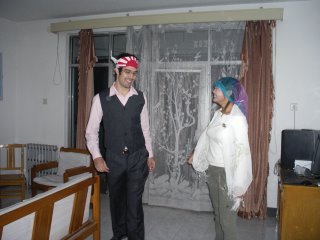 Chinese ghost, foreign devil.
Chinese ghost, foreign devil. Pumpkins
Pumpkins Failure
Failure And sucess
And sucess
 We were there for the Chrysanthamum show. The flowers were nice. Here are some nice yellow and red and purple ones behind Lisa and Mr. Zhao and Ye Dong of the FAO.
We were there for the Chrysanthamum show. The flowers were nice. Here are some nice yellow and red and purple ones behind Lisa and Mr. Zhao and Ye Dong of the FAO. Ok. And here is a giant paper-mache rooster on a flower globe depicting China surrounded by more nice flowers and some plastic deer, for some reason.
Ok. And here is a giant paper-mache rooster on a flower globe depicting China surrounded by more nice flowers and some plastic deer, for some reason. Remember what I wrote about unintentional poses being funny. Well as Bernice is demonstrating, they're even funnier when you know the person...and a semi-abstract giant golden rooster is involved. But the roosters make sense, it's the year of the rooster. So do the peacocks (not shown) because they are easy to make out of flowers and are pretty and stuff. And then...
Remember what I wrote about unintentional poses being funny. Well as Bernice is demonstrating, they're even funnier when you know the person...and a semi-abstract giant golden rooster is involved. But the roosters make sense, it's the year of the rooster. So do the peacocks (not shown) because they are easy to make out of flowers and are pretty and stuff. And then... "So I really like the purple ones and those balls of flowers are....is that....a pair of....giraffes.....?"
"So I really like the purple ones and those balls of flowers are....is that....a pair of....giraffes.....?"




